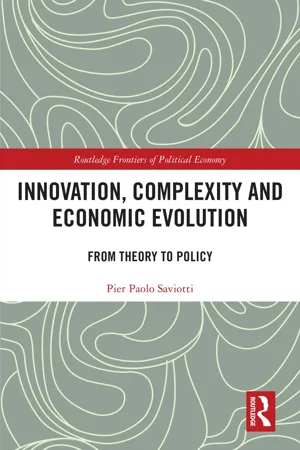
- 268 pages
- English
- ePUB (mobile friendly)
- Available on iOS & Android
About This Book
If evolutionary economics is to compete with neoclassical economics as a general-purpose economic theory, it needs to incorporate new aspects of socioeconomic reality, such as institutions of all types, including technical, scientific, and political. Furthermore, evolutionary economics needs to be able to provide policy implications at least as interesting as those of neoclassical economics. Thus, as this book argues, evolutionary economics must become evolutionary political economy.
Innovation plays a central role in the book, but not in the sense of providing a technologically determinist interpretation. Rather, the book argues that innovations do not emerge in isolation from other components of socioeconomic systems but coevolve with institutions, infrastructures and organizational forms. This concept of coevolution is absolutely central in the book and provides a link with theories of complexity. In addition to providing an epistemological basis for evolutionary economics, the link with complexity and coevolution offers the connection with evolutionary political economy. Innovations and technologies do not emerge and develop in an institutional vacuum, but interact with existing institutions and reshape them, in addition to inducing the formation of new institutions. In this process, technologies and institutions reinforce each other providing a potential mechanism to transform socioeconomic systems. The book also explores the policy implications of these innovative societies, where wealth is created but unequally distributed.
The book is addressed to open-minded economists, social scientists who are dissatisfied with the approach of neoclassical economics, technologists and policy makers.
Frequently asked questions
Table of contents
- Cover
- Half Title
- Series Page
- Title Page
- Copyright Page
- Dedication
- Table of Contents
- Preface
- 1 Economics, qualitative change, and discontinuities
- 2 The coevolution of innovation, technologies and institutions
- 3 Adaptive behaviour as the most general form of socioeconomic behaviour
- 4 Knowledge and economics
- 5 Structural change, differentiation, and economic development
- 6 Complexity and evolutionary theories
- 7 Evolutionary political economics
- 8 Policy implications of evolutionary economics
- Index